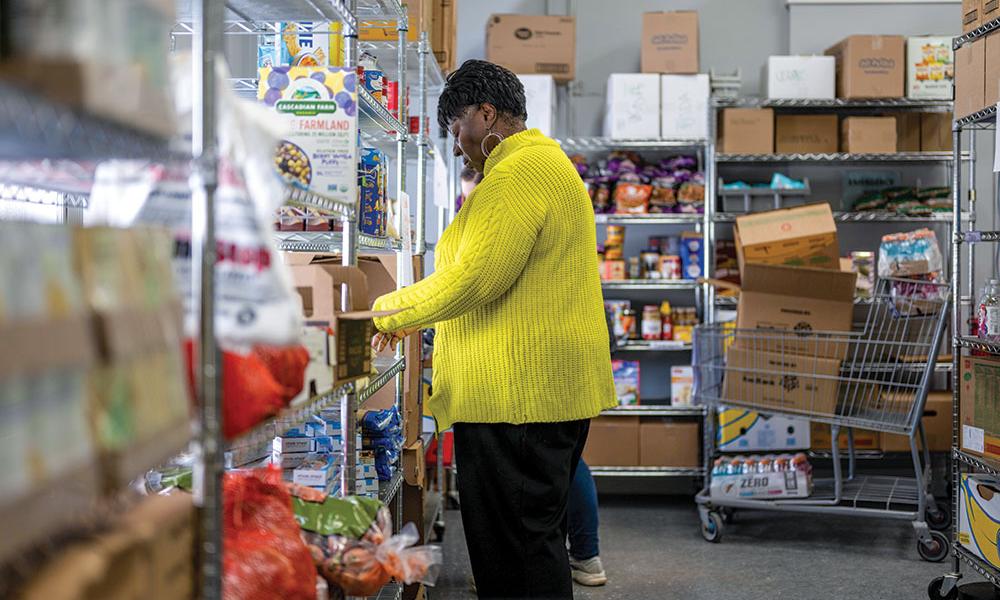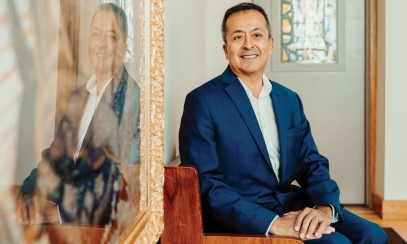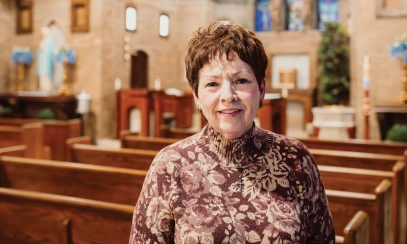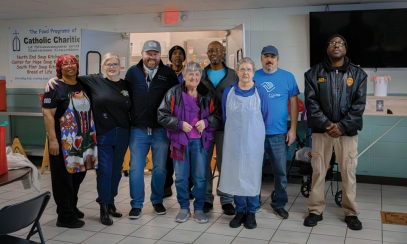
‘They’re All God’s Kids’
How the Cristo Rey Community Center is transforming lives, one person at a time
How the Cristo Rey Community Center is transforming lives, one person at a time
Like many other parts of the city, the North Lansing neighborhood surrounding Cristo Rey Community Center knows what it means to struggle.
Like many other parts of the city, the North Lansing neighborhood surrounding Cristo Rey Community Center knows what it means to struggle.
Hemmed in by Old U.S. 27 and Lake Lansing Road to the west and north, Oakland Avenue to the south, and the woods of Bancroft Park to the east, the neighborhood is about a square mile of storefronts – some open, many shuttered – and small residential lots, most of the homes built in the early 1900s.
Among the clients who use the center’s safety net services – the food pantry, community closet, and hot meals, for example – Cristo Rey CEO Joe Garcia observes that many of them are from those homes.
“They’re just like you and me,” he said, reflecting on the circumstances that might lead neighbors to seek help at the center.
“Sometimes bad stuff happens to anybody, and it can put a person in a bad situation,” he continued. “They’re all God’s kids.”
The data on the neighborhood’s poverty is bleak. The U.S. poverty rate hovers around 11 percent. In contrast, according to the latest data from the 2020 U.S. Census, Lansing’s poverty rate is a little over 20 percent. In Cristo Rey’s neighborhood, particularly the blocks south of the community center, that number is over 30 percent. It’s a neighborhood where, U.S. Census data estimate, nearly every child under the age of six is receiving public medical coverage such as Medicaid, and over half (60 percent) of households with children under 18 receive food stamps or SNAP benefits.
Yet even with food benefits, fresh, healthy food is hard to come by for people who don’t have access to a car. The area is in what’s known as a food desert – the USDA notes that a significant portion of the neighborhood is low-income, lacks personal access to a vehicle and lives at least a mile from a grocery store. According to the Greater Lansing Food Bank’s list of food pantries in the Lansing area, Cristo Rey is one of only three that offer produce distribution, and is the only one in North Lansing to do so.
Joe is up front about the scale of basic human needs Cristo Rey faces every day.
“Nonprofits are Davids fighting Goliath-sized problems, and we have to do it together,” he said. “Because these problems are great.”
The David and Goliath analogy is perhaps clearest in the center’s Family Health Center, which kept nearly 11,000 appointments last year, over 90 percent of those patients either being on Medicaid or Medicare, or uninsured. It’s a ratio that no for-profit clinic would ever touch, with Medicaid’s rates of reimbursement to providers falling at around half the rate of traditional insurers.
Add that to Cristo Rey’s choice to keep 30-minute appointments, versus the quick turnaround of 12-15 minute appointments at most doctors, plus the backlog of chronic health problems typically seen in an underserved population, and the result is a clinic that scrapes by through fundraising, outside sources such as Diocesan Services Appeal allocations from the Diocese of Lansing, and the heroic service of the Sisters of Mercy, two of whom are medical providers at the clinic.
“The Sisters of Mercy are an absolute gift to us all,” Joe said. “You want a good example of what our faith can bring, what Jesus does for us? (They) are a treasure. … helping God’s people regardless of whether they’re Catholic or not.”
“We already make half of what your doctor makes to see a patient, plus your doctor is seeing twice as many,” Joe continued, pragmatically laying out the sacrifices Cristo Rey makes in its deliberate choices to prioritize a relationship with patients and uphold their dignity.
“It takes more time to build rapport, to establish trust with patients so they’re willing to tell their story to us again,” he explained. “Many Medicaid or Medicare patients are quite silent when they go to the doctor, because they’re so tired of not being heard.”
In addition to adhering to Catholic medical ethics, “we have to pick and choose what we’re doing here,” Joe went on. “But for every person who comes in, we can be an understanding and sympathetic ear. We can treat them with dignity. We can stop what we’re doing and demonstrate that we’re listening. We can remember someone’s name. Those things we can do 100 percent of the time.”
For Damien Strieff, that kind of care is literally life-saving.
As a Type 1 diabetic, “within 18 hours without insulin, I will start to die,” Damien said recently in a video interview with Cristo Rey. “It’s not a prescription I can afford to not take.”
Liticia Rodriguez, who runs Cristo Rey’s Prescription Assistance Program, says insulin is the most needed prescription by her clients, who are referred from the center’s clinic, as well as other area doctors and social services.
“It really doesn’t matter what insulin you prescribe them, all of them are over $100 a month,” Liticia said. “They’re like, ‘we don’t have that kind of money.’”
Qualifying patients receive free prescriptions directly from the pharmaceutical company for a year, after which Liticia helps them apply again.
“Something has been lifted off their shoulders,” she said.
“Before Cristo Rey, it was a constant struggle to get my insulin on time … because of not being able to afford (it),” Damien said. “If Cristo Rey didn’t exist, I don’t know if I would be alive or not. And I’m sure my 15-year-old son would definitely say he speaks the world of Cristo Rey for helping out his dad to live another day.”
Joe is direct when he considers what would happen if the center stopped its services.
“There would be less options for people, (and) more people would die,” he said, pointing out efforts funded, in part, through DSA contributions – counseling programs that assist people in substance abuse recovery, the personal needs pantry that might provide baby formula to a mother who’d otherwise resort to watering down bottles, or the treatable illnesses caught by the health clinic.
Facing the Goliath of poverty that can drive people to desperation and hopelessness, Joe knows his staff at Cristo Rey will never be able to solve every societal problem that rears its head outside their doors. But they can save individual lives. They can hold a hand, provide a prescription, and affirm a neighbor’s dignity.
As Damien said, “They will provide for you, they will fight for you, they will make sure you are cared for.”
And it’s a fight that’s only possible through the solidarity of the greater community, including members of the Diocese of Lansing. Joe extends an open invitation to anyone in nearby parish communities who are curious about how they could be involved in or support Cristo Rey’s ministries.
“I welcome anyone to come visit,” he said. “I just want them to see what we’re doing here.”
That mission is simple.
“We’re all God’s children,” Joe said. “And when we’re in the position to help each other, we should. It’s not anything more elaborate than that.”
The mission of Catholic Charities in the Diocese of Lansing is the work of the Catholic Church: to share the love of Christ by performing the corporal and spiritual works of mercy.
Catholic Charities of Jackson, Lenawee and Hillsdale Counties
- Jackson: 3425 Francis Street, 517.782.2551
- Adrian: 199 N. Broad Street, 517.263.2191
- Hillsdale: Call 517.263.2191 for an appointment
Catholic Charities of Shiawassee and Genesee Counties
- Owosso: 1480 N. M-52, Suite 1, 989.723.8239
- Flint: 901 Chippewa Street, 810.232.9950
Catholic Social Services of Washtenaw County
- Ann Arbor: 4925 Packard Road, 734.971.9781
Livingston County Catholic Charities
- Howell: 2020 E. Grand River Ave., Suite 104, 517.545.5944
St. Vincent Catholic Charities
- Lansing: 2800 W. Willow, 517.323.4734
Cristo Rey Community Center
- Lansing: 1717 N. High St., 517.372.4700
Elizabeth Hansen is a freelance writer in Lansing who attends the Church of the Resurrection.



